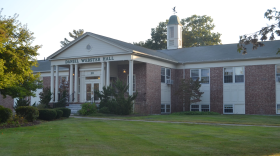Cities across New Hampshire are holding elections on Tuesday. In Nashua, voters will be deciding whether the city’s police commission should be chosen by the mayor and Board of Aldermen, instead of the governor and Executive Council.
The police commission oversees the Nashua Police Department’s rules and budget. It also approves new hires and has the authority to remove officers from the force.
Police reform advocates in support of the changes say the commission should be under local control.
Nashua Police Chief Michael Carignan has been vocal in his opposition to having local politicians appoint commissioners, saying the change would lead to less transparency. In an open letter to the mayor and Board of Aldermen, a group of residents and local business leaders called for a study committee and community conversations to explore the issue further, before any changes are implemented.
NHPR’s Morning Edition host Rick Ganley spoke with activist Sonia Prince, who helped get the proposed changes to the commission on the city ballot. Below is a transcript of their conversation.
Rick Ganley: Nashua is the only city in the state where the governor and the Executive Council appoints police commissioners. Now this question on the ballot asks whether the Nashua mayor and Board of Aldermen should choose who serves in the commission instead. Sonia, can you explain why you think it's so important that this is under local control?
Sonia Prince: Yes, every city and town in New Hampshire has local control, and I can understand why, since Nashua is the last city to try and get local control since 1891. I think one of the reasons is it's difficult to change a charter. We had to knock on a lot of doors -- 2,100 doors -- to get signatures to put the question on the ballot. So it's not everybody who can take the entire summer off to do such a project. So it took a lot of like-minded people to do so.
I am a feminist and it's hard for me to explain to my daughter why there are no women on the police commission for the last 129 years, with the exception of one woman who was a judge. So that was one of the reasons. The other reason is when I knocked on the doors, most people thought we had one police commissioner and I'd explain we have three.
And they didn't really know much about it and how they were appointed, etc. So I would have to explain it to them. And I think if we were having an open public process in Nashua, by Nashuans, voted on by 15 elected board of Aldermen selected by the people of Nashua, I think it would be a lot better for our city and everybody would have public input.
Rick Ganley: And voters are deciding whether to increase that number of people serving on the commission from from three to five. Why do you think it does need more members? What does that bring?
Sonia Prince: Well, we looked at other commissions around the state, and Manchester has five. My personal feeling is I can't see how the commission could explain away, or whoever appoints them, that a woman or maybe a person of color would not be able to have a seat at the table when there's five seats versus three seats. So having more seats, I think, gives more opportunity for diversity and better representation of the people.
Rick Ganley: Nashua's police chief, Michael Carignan, has been really vocal in his opposition to this change. He said he thinks involving local politicians in the appointment process will lead to less transparency on the police commission. Have you talked with him or any other members of the department about their thoughts on this?
Sonia Prince: I serve on committees with him. We disagree on a lot of topics. I did not bring it up because it wasn't something that we would agree on. I am aware that most people who are appointed to the police commission are usually males over 60, and often they're either former police officers or people related to the police department, such as their [Nashua PAL] program, police athletic groups and things like that.
Rick Ganley: So again, your feeling is you want a more diverse representation?
Sonia Prince: Right, and transparency wise, our public meetings at the Board of Aldermen are televised. You can show up. I highly doubt the people of Nashua are going to drive to Concord to listen to what the governor and the executive councilors are talking about. Nor do they even know when or what's happening. And I think more people would be paying attention if it was televised and happening in Nashua.








